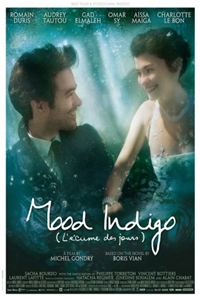Mood Indigo (L'ecume des jours) (NR) ★★★★
 Michel Gondry might not be an expert storyteller, but he is a master of imagination. Where your average American movie adheres to a rigid and familiar structure - an A-to-B throughline that limits opportunity for creative exploration - Gondry vies for the opposite extreme: his latest film, Mood Indigo, could benefit from a few tweaks in the department of narrative form.
Michel Gondry might not be an expert storyteller, but he is a master of imagination. Where your average American movie adheres to a rigid and familiar structure - an A-to-B throughline that limits opportunity for creative exploration - Gondry vies for the opposite extreme: his latest film, Mood Indigo, could benefit from a few tweaks in the department of narrative form.
Meandering from one dreamy sequence to the next, the film falters in its delivery of what is meant to feel like a cogent love story/human tragedy. What it offers up instead is a nonstop carousel ride of wonderful ideas and images, all temperate beverages for our thirsty eyes. They more than make up for the film's narrative shortcomings, but that latter fault is what keeps Mood Indigo from being as thrilling and evocative as it otherwise might.
Gondry has directed some fine scripts to states of splendor - he knocked Eternal Sunshine out of the park and gave us the erratic but successfully cohesive Science of Sleep. While each of these markedly bizarre movies feels like a mapped adventure with a clear course through Gondry's right brain, Mood Indigo (which he adapted with Luc Bossi from Boris Vian's novel) comes off more like a pit stop at a mental playground. It's a pleasure to see the director play freely with the products of preadolescent hallucinations, but the momentum trips up when we spend so much time ogling insectile doorbells, motorized feasts, elastic dance moves, high-speed boxcar races, and so many more odd turns.
Eventually, we get to the story, of which the movie takes even longer to acknowledge the presence than this review does. It's a romantic tragedy that has the Quixotic Colin (Romain Duris) caring for his new love and newer bride Chloé (Audrey Tautou, the cast standout) when she falls ill. In the latter half of the movie, Gondry uses his ambitious style to perfection, driving home the pangs of both parties - and those of their friends, stress-addled Nicolas (Omar Sy), obsessive addict Chick (Gad Elmalah), and the emotionally neglected Alise (Aïssa Maïga) - with darker hued dream clouds.
The talents of this team help the often jagged film carry forth. Tautou is positively magnetic in her comedic, dramatic, and romantic scenes alike. Backdrop players Sy, Elmalah, and Maïga pepper in a dynamic nuttiness that works in perfect congruence to the film's first half, and a tragic sickness that works just as well in the second half.
It is in this late chapter that the film becomes more than an experiment in visual charms, evolving to a highly evocative and surprisingly down-to-earth platform without pulling any punches in the oddball department. Still, we're entering an intimacy with these characters too late into the film in order for their emotional beats to land as effectively as they should. Gondry spends so much time introducing us to the various constructs and facets of his wild, vast, unique world that he slips up on introducing us to the people who occupy it. When we finally do get to know them, even the ones we've liked all along, it can be a strain to accept them as real people.
But fragmented though this story and these characters may be, they're all surrounded by such wonderful spectacle that it would be difficult to leave this movie without a supercharged heart and a jump-started imagination. These achievements are enough to render any of Moon Indigo's structural weaknesses a secondary thought.
To get the full Quicklook Films experience, uncheck "Enable on this Site" from Adblock Plus
box office top 10

Civil War Released: April 12, 2024 Cast: Kirsten Dunst, Wagner Moura 11.1M

Abigail Released: April 19, 2024 Cast: Melissa Barrera, Dan Stevens 10.2M

Godzilla x Kong: The New Empire Released: March 29, 2024 Cast: Rebecca Hall, Brian Tyree Henry 9.5M

The Ministry of Ungentlemanly Warfare Released: April 19, 2024 Cast: Henry Cavill, Eiza Gonzalez 9M

Spy x Family Code: White Released: April 19, 2024 Cast: Takuya Eguchi, Saori Hayami 4.9M

Kung Fu Panda 4 Released: March 8, 2024 Cast: Jack Black, Viola Davis 4.6M

Ghostbusters: Frozen Empire Released: March 22, 2024 Cast: Paul Rudd, Carrie Coon 4.4M

Dune: Part Two Released: March 1, 2024 Cast: Timothée Chalamet, Rebecca Ferguson 2.9M

Monkey Man Released: April 5, 2024 Cast: Dev Patel, Sikandar Kher 2.2M

The First Omen Released: April 5, 2024 Cast: Nell Tiger Free, Bill Nighy 1.7M






